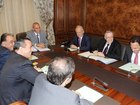President Michel Suleiman has considered a move by Speaker Nabih Berri to hold a parliamentary session “non-consensual if a political team opposes it.”
His visitors told An Nahar daily published Thursday that the constitutional studies indicate that “mobile draft-laws” could be adopted and that “a cabinet session could also be constitutional to find a solution to pressing issues.”
 Full Story
Full Story
The March 14 leadership has decided that the coalition’s MPs would boycott a parliamentary session called for by Speaker Nabih Berri on June 8 to take decisions on critical issues amid the absence of a government.
Sources close to the leaderships described attempts by Berri to release the agenda of the session as an “unprecedented heresy” in light of the rejection of five members of the parliament’s bureau committee for the concept of a legislative session.
 Full Story
Full Story
Premier-designate Najib Miqati has said that he “irrevocably ruled out the formation of a technocrat or de facto government” and reiterated that he rejects turning the cabinet into “provinces.”
Miqati confirmed to his visitors that several formulas have been suggested to end the government deadlock but blamed the large number of conditions for the delay in the formation of the cabinet.
 Full Story
Full Story
Lebanese Forces leader Samir Geagea on Wendesday stressed that “a parliamentary legislative session cannot be held amid the absence of a (new) government and the presence of a caretaker cabinet, because the parliament is a legislative and not an executive authority.”
Geagea warned of “the deteriorating economic situation in the country which is not being tackled by the officials.”
 Full Story
Full Story
MP Ali Hassan Khalil, Speaker Nabih Berri’s political aide, on Wednesday lashed out at the March 14 camp, accusing some of its leaders of waging a “systematic campaign” against the house speaker.
“It seems that there is a systematic campaign … being waged by some of the leaders” of the March 14 camp “who are outside the country and are trying to respond to Speaker Berri’s remarks that ‘the Cedar Revolution has set Lebanon back 60 years,’” Khalil said.
 Full Story
Full Story
Hizbullah Secretary-General Sayyed Hassan Nasrallah on Wednesday called for “acknowledging the flaws” in the Lebanese constitution and ending the years-old debate in the country over amending the Taef Accord, which ended the 1975-1990 civil war.
Nasrallah called instead for working on improving the Lebanese political system through dialogue and away from sectarian considerations.
 Full Story
Full Story
Fatah leader in Lebanon Munir Maqdah denied on Wednesday reports that the Fatah and Hamas Palestinian groups will not take part in the Naksa Day rally scheduled for June 5.
He told the Central News Agency: “All Palestinian factions will participate in the event, including institutions from Lebanon’s civil society.”
 Full Story
Full Story
Speaker Nabih Berri headed on Wednesday a meeting for the Parliament Bureau Committee, after which the schedule for next week’s June 8 parliamentary session was distributed.
Official sources from the meeting stated that the schedule includes draft laws and proposed projects to be addressed by the MPs.
 Full Story
Full Story
Speaker Nabih Berri reportedly said on Wednesday that if next week’s legislative session faced lack of quorum, he will not back off and will insist on holding it.
“He will call for a second, third and fourth session until it is held,” lawmakers quoted Berri as saying during his weekly meeting with them at parliament.
 Full Story
Full Story
Government Commissioner to the Military Tribunal Judge Saqr Saqr charged Sheikh Mohammed Ali Ismail al-Husseini with spying for Israel on Wednesday.
The army intelligence detained al-Husseini, who is the secretary-general of the Arabic-Islamic Council, last week after suspecting that he had collaborated with the Israeli Mossad.
 Full Story
Full Story



